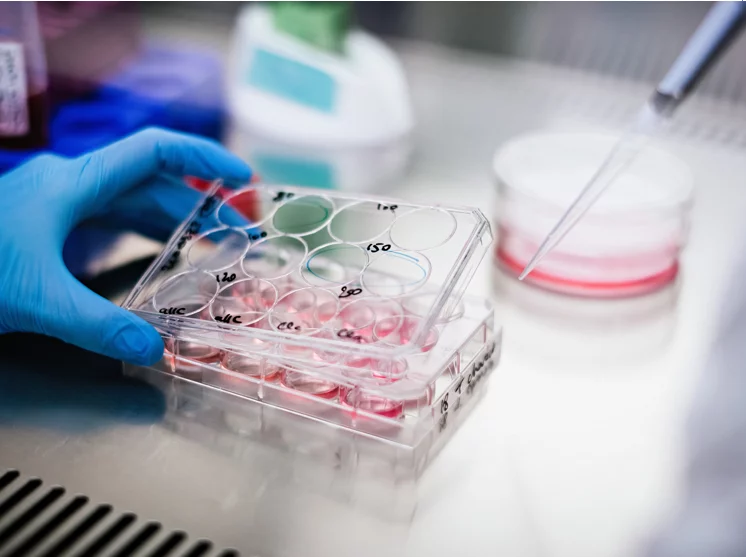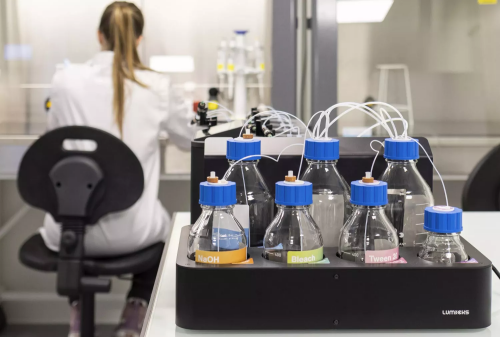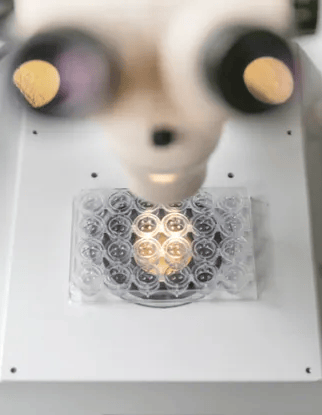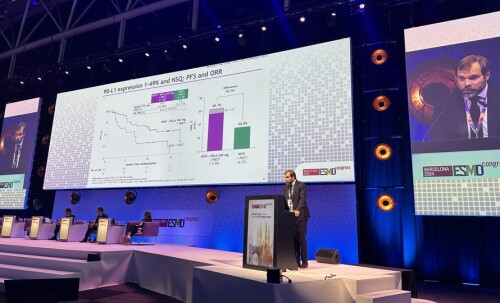Paris (France), January 30, 2023 - Qubit Pharmaceuticals, a deeptech company specializing in the discovery of new drug candidates using simulation and AI accelerated by hybrid HPC[1] and quantum computing, and Institut Curie, France's leading center in the fight against cancer, announce their collaboration in the search for new therapeutic avenues to treat cancer. The project will be carried out in partnership with the Laboratoire de Microbiologie Fondamentale et Pathogénicité at the University of Bordeaux.
TREX1 enzyme, a "two-in-one" therapeutic target
As cells proliferate, they can get compressed, and their nuclei can rupture. In a study[2] published in 2021 in the journal Cell, researchers from Institut Curie, Inserm and CNRS have shown that these ruptures allow DNA to come into contact with the TREX1 enzyme, whose usual function is to protect the cell from external threats. As a result, the tumor progresses towards more dangerous invasive stages.
By specifically blocking this enzyme, it should be possible to amplify the efficacy of treatments, as explained by Dr. Nicolas Manel, Inserm researcher and head of the "Innate Immunity" team at Institut Curie (Inserm U932), author of the work leading to this discovery: "TREX1 represents a target of great interest, acting on two major therapeutic axes. Successfully inhibiting it would significantly increase the immune response against tumor cells and block metastatic processes."
All three partners will combine their expertise to inhibit this key agent. This collaborative approach reflects the shared commitment of Qubit Pharmaceuticals, Institut Curie and the University of Bordeaux to explore innovative approaches to the development of more targeted and effective cancer therapies.
The power of high-performance computing, simulation and AI to accelerate the discovery of drugcandidates.
With its Cancer Immunotherapy Center, the only one of its kind in France, Institut Curie brings together doctors, researchers, and healthcare professionals to expand our understanding and develop the immunotherapies of tomorrow. Building on the expertise of Dr. Nicolas Manel and his team, Qubit Pharmaceuticals will leverage Atlas, its drug design platform, to generate new molecules with a profile specifically optimized to inhibit this target. Atlas is capable of creating true digital twins of drug candidates and can predict their interactions extremely accurately and rapidly thanks to high-performance computing. This makes it possible to explore and imagine new molecules that conventional approaches would not have identified.
As soon as these molecules have been identified and synthesized, Dr. Manel's team at Institut Curie will validate them using biological tests. The University of Bordeaux will carry out biochemical and structural characterizations of the identified leads, thanks to the work of the group led by Dr Paul Lesbats, a CNRS researcher at the Laboratoire de Microbiologie Fondamentale et Pathogénicité, specialized in understanding the consequences of molecular interactions between proteins and their ligands.
The aim is to significantly shorten the early stages of drug candidate discovery in order to bring new therapeutic solutions to patients.
Robert Marino, CEO Qubit Pharmaceuticals, states: "The fight against cancer is a major objective for Qubit Pharmaceuticals, and we are extremely pleased to be able to collaborate with Institut Curie in its historic fight for research in this field. Our areas of expertise are complementary. I am convinced that this dual approach combining simulation & AI, and in vivo validation led by expert teams is an opportunity to accelerate the discovery of drug candidates to improve patients' lives. We are delighted and honored to be working with Institut Curie & the University of Bordeaux along these lines."
"Even before clinical trials begin, the selection of drug candidates is time-consuming and costly. Leveraging simulation and artificial intelligence will considerably speed up this stage, enabling patients to benefit as quickly as possible from a promising new immunotherapy treatment," explains Dr. Cécile Campagne, Director of Institut Curie’s Technology Transfer Office and Deputy Director of Carnot Curie Cancer.
References :
[1] High performance calculation
[2] Reference : G. Nader et al., Compromised nuclear envelope 1 integrity drives TREX1-dependent DNA damage and tumor cell invasion, Cell, 21 septembre 2021. DOI : 10.1016/j.cell.2021.08.035
Image : © Institut Curie / Franck Juery
About Qubit Pharmaceuticals
Qubit Pharmaceuticals was founded in 2020 with the vision of co-developing new, more effective and safer drugs with pharmaceutical and biotech companies. A spin-off from the research work of five internationally renowned scientists - Louis Lagardère (Sorbonne University and CNRS), Matthieu Montes (CNAM), Jean-Philip Piquemal (Sorbonne University and CNRS), Jay Ponder (Washington University in St Louis), Pengyu Ren (University of Texas at Austin) - Qubit Pharmaceuticals leverages its Atlas platform to discover new drugs through simulation and molecular modeling accelerated by hybrid HPC and quantum computing. The multidisciplinary team, led by CEO Robert Marino, and the founders are based in France at the Paris Santé Cochin incubator and in the USA in Boston.
For more information, or to join an ambitious team, visit www.qubit-pharmaceuticals.com
About Institut Curie
Institut Curie, France’s leading cancer center, combines an internationally-renowned research center with a cutting-edge hospital group, treating all types of cancer, including the rarest. Founded in 1909 by Marie Curie, Institut Curie has 3 sites (Paris, Saint-Cloud and Orsay) with over 3,700 researchers, physicians and health professionals working on its 3 missions: treatment, research and teaching. A private foundation with public utility status, Institut Curie is authorized to accept donations and bequests, and thanks to the support of its donors, is able to accelerate discoveries and improve patient treatment and quality of life.
To find out more: www.curie.fr Twitter, Facebook, LinkedIn, Instagram
Institut Curie has been a certified “Carnot Curie Cancer Institute” since 2011. The Carnot certification is a recognition of excellence awarded to academic research organizations whose quality and involvement in partnership-based research have been demonstrated. Curie Cancer offers industrial partners the opportunity to implement research collaborations utilizing the expertise of Institut Curie’s research teams to develop innovative therapeutic solutions for cancer, from therapeutic target to clinical approval. Curie Cancer is a member of the Carnot FINDMED network, a group of thirteen Carnot institutes, to facilitate access to their technological platforms and to their innovations for very small and medium-sized companies in the pharmaceutical industry.
Find out more: http://www.instituts-carnot.eu/fr/institut-carnot/curie-cancer - https://findmed.fr
About the University of Bordeaux
The of University of Bordeaux is a multi-disciplinary, international research university with a history spanning almost six centuries. With almost 54,000 students and 6,000 staff, including nearly 3,200 teacher-researchers and researchers, it is a major player in the Neo-Aquitaine region and one of France's leading universities, recognized for the excellence of its research, the quality of its degrees (from BUT to doctorate) and its capacity for innovation. With the "Initiative d'Excellence" label, it contributes to major scientific advances with its academic and socio-economic partners in France and abroad.
Media contacts :
Qubit Pharmaceuticals
Bruno Arabian – barabian@ulysse-communication.com – +33 6.87.88.47.26
Nicolas Daniels – ndaniels@ulysse-communication.com - + 33 6.63.66.59.22
Institut Curie
Elsa Champion - elsa.champion@curie.fr / +33 7 64 43 09 28
Myriam Hamza - myriam.hamza@havas.com / +33 6 45 87 46 51
Université de Bordeaux
Blandine Laccassagne – Blandine.laccassagne@u-bordeaux.fr / +33 6 46 45 76 56
Gaëlle Héron – gaelle.heron@u-bordeaux.fr / +33 6 15 05 43 36



